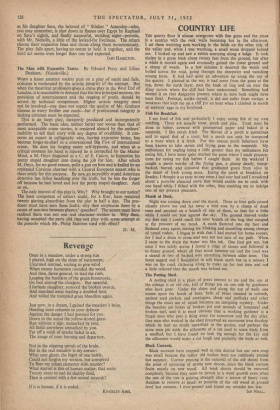The Man with Expensive Tastes. By Edward Percy and Lilian
Denham. (Vaudeville.) WHEN a lesser amateur society puts on a play of merit and fails, criticism is moderated by the artistic integrity of the attempt. But when the theatrical profession gives a crime play in the West End of London, it is reasonable to demand that the two principal motives, the provision of entertainment and the reaping of profit, should be served by technical competence. Higher artistic integrity need not be involved—one does not expect the quality of Mr. Graham Greene in every thriller one reads—but if professional integrity is lacking criticism must be expected.
This is an inept play, inexpertly produced and incompetently performed. The basic idea, neither better nor worse than that of most acceptable crime stories, is rendered absurd by the authors' inability to tell their story with any degree of credibility. It con- cerns an expert in calligraphy who, having expensive tastes, has become forger-in-chief to a conventional Big Five of international crime. He does his forging under self-hypnosis, and when at a critical moment his hand is injured he is compelled by the Master Mind, a M. Onyx disguised as a C. of E. Canon, to hypnotise his pretty stupid daughter into doing the job for him. After which M. Onyx, for no good reason, pulls a gun on him and is knifed by an orphaned Corsican charmer with a Central European accent who is there solely for this purpose. By now an incredibly stupid American detective has fallen headlong over the truth, but he lets the forger off because he had loved and lost the pretty stupid daughter. And so on.
The only interest of this play is, Why? Why brought to our notice? The least competent of editors could, for a fiver, have removed twenty glaring, absurdities from the plot in half a day. The pro- ducer must have seen these faults; why then emphasise them by a count of one-two between players' speeches? The actors must have realised there was not one real character written in. Why then, having accepted the parts did they not play with some attempt at the panache which Mr. Philip Stainton used with effect?
D. M.


































 Previous page
Previous page